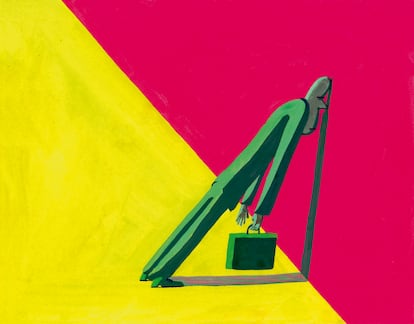Living in the era of ‘The Great Exhaustion’
It feels like we’re always tired, but what if it’s because we really are?

“How are you?” It’s a common greeting, and people used to reply, “Fine,” “Bad,” or just “Okay.” These days, the automatic response tends to be, “I’m exhausted.” When you ask why, no one can tell you. Is it the workload? All the wars and conflicts in the world? Our post-pandemic society? Inflation? What if it’s everything everywhere all at once?
Extreme exhaustion can make even the simplest tasks feel overwhelming. From returning clothes that don’t fit to scheduling appointments or clearing your email inbox, it’s not about laziness. You handle all your work, family and other responsibilities, but your brain feels too full for anything else. Sometimes, there’s no room for the things you enjoy. You just don’t feel up to it, or as Anne B. Petersen wrote in a BuzzFeed article, How Millennials Became the Burnout Generation: “Why can’t I get this mundane stuff done? Because I’m burned out. Why am I burned out? Because I’ve internalized the idea that I should be working all the time.”
Psychologist Emily Ballesteros noted in a recent Time magazine article that if the United States experienced “The Great Resignation” (when over 47 million Americans voluntarily quit their jobs) after the pandemic, we’re now living in the era of “The Great Exhaustion.” The causes of this exhaustion, says Ballesteros, are unsustainable lifestyles, exposure to stress outside of our control, and financial insecurity. “We have not built a human-needs-first society; we have built a business-needs-first society, and it is starting to show... We can endure difficulties with much higher morale when we retain hope that things will get better. When everywhere we turn there is news making us feel like things aren’t getting better, we begin to break down.” As for financial insecurity, Ballesteros writes, “We have been a work-centered society for generations; however, it is becoming increasingly harder to convince people to live a busy, work-centered life when it doesn’t translate to the quality of life that it used to.”
“Many factors have brought about this mental health crisis, but really, it’s about deteriorating living conditions that make us feel less significant in the world. Plus, there’s that pressure to always perform better, making us think we’re not doing enough or growing intellectually, socially, or personally. We’re constantly told to push harder,” said Spanish author Eudald Espluga, who wrote a book about the global phenomenon of exhaustion. Espluga notes that while this exhaustion isn’t specific to a particular generation, millennials and Gen Z (who entered the workforce after the 2008 financial crisis) have faced adult lives marked by constant insecurity.
The term burnout was first identified as a psychological condition in 1974 by psychologist Herbert Freudenberger, who use it to describe cases of physical or mental breakdown due to excessive work or stress. According to a report by Gallup in 2023, 44% of workers felt stressed, a historically high number. In January 2022, the American Psychological Association noted that pandemic stressors had led to persistent and vague challenges, resulting in increased cognitive and emotional exhaustion, as well as physical fatigue. “The pandemic, for many, has felt like constantly struggling to poke our heads above the water, just to be hit with another wave again,” wrote Valentina Stoycheva in a Psychology Today article.
Similarly, Josh Cohen explored in The Economist whether there is more to burnout than working too hard. He argued that the root of the problem lies deeper than that. That feeling when you’re totally drained, yet you can’t shake the urge to keep pushing forward, could be illustrated as a dead battery. But instead of recharging when plugged in, the battery simply starts to smoke. Or perhaps the picture is a burned matchstick with legs. Exhausted from feeling exhausted and living in a society of collective exhaustion.
Sign up for our weekly newsletter to get more English-language news coverage from EL PAÍS USA Edition
Tu suscripción se está usando en otro dispositivo
¿Quieres añadir otro usuario a tu suscripción?
Si continúas leyendo en este dispositivo, no se podrá leer en el otro.
FlechaTu suscripción se está usando en otro dispositivo y solo puedes acceder a EL PAÍS desde un dispositivo a la vez.
Si quieres compartir tu cuenta, cambia tu suscripción a la modalidad Premium, así podrás añadir otro usuario. Cada uno accederá con su propia cuenta de email, lo que os permitirá personalizar vuestra experiencia en EL PAÍS.
¿Tienes una suscripción de empresa? Accede aquí para contratar más cuentas.
En el caso de no saber quién está usando tu cuenta, te recomendamos cambiar tu contraseña aquí.
Si decides continuar compartiendo tu cuenta, este mensaje se mostrará en tu dispositivo y en el de la otra persona que está usando tu cuenta de forma indefinida, afectando a tu experiencia de lectura. Puedes consultar aquí los términos y condiciones de la suscripción digital.









































